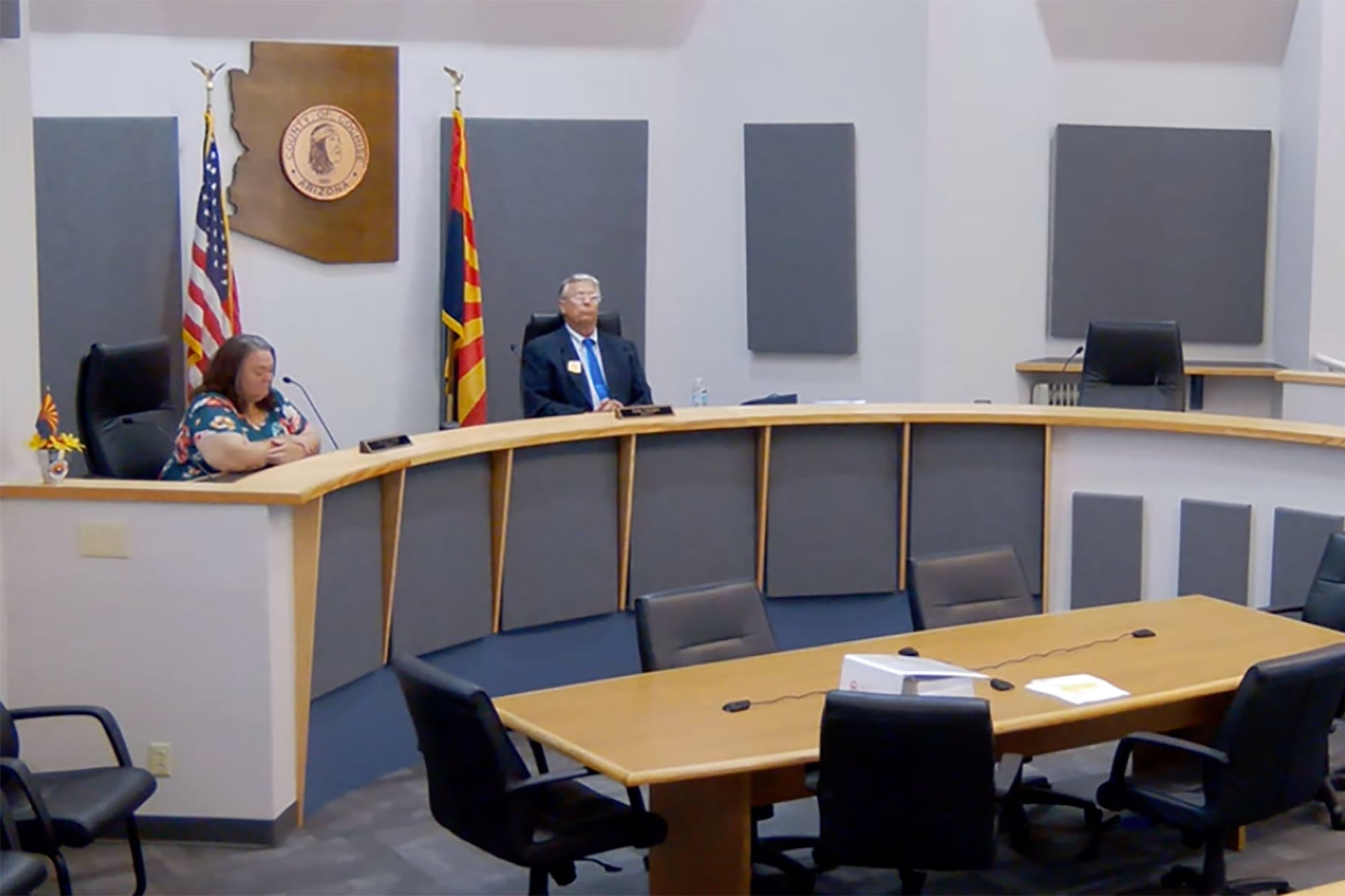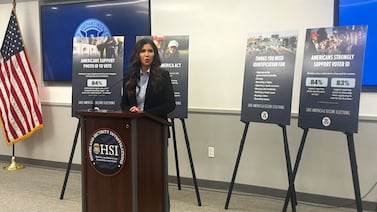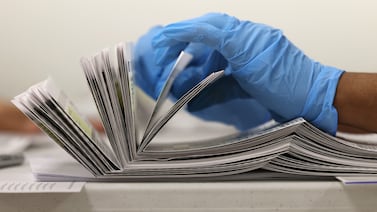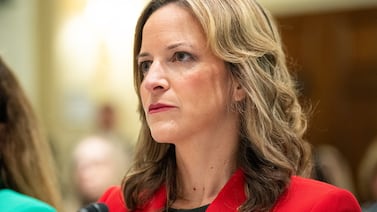Votebeat is a nonprofit news organization reporting on voting access and election administration across the U.S. Sign up for Votebeat Arizona’s free newsletter here.
When two Republican Cochise County supervisors delayed their certification of the county’s 2022 election results, a judge forced them to certify, pointing to language in Arizona’s election manual that says they have no choice.
A state grand jury later charged the two supervisors with two felonies — conspiracy, and interference with the secretary of state’s duty to certify the election. And two secretaries of state have sought to make the rules about supervisors’ duties more explicit.
A recent court ruling, though, challenges the long-held presumption in Arizona that supervisors have no discretion when certifying election results. The court threw out that section of the Elections Procedures Manual entirely, saying it goes further than the statute supports.
The decision could shake up the pending criminal trial against one of the Cochise supervisors, Tom Crosby, as a judge weighs his latest request to dismiss the charges. (The other supervisor, Peggy Judd, pleaded guilty to a misdemeanor as part of a deal with prosecutors last year.)
It could also encourage supervisors across the state to test the boundaries of the state’s certification law by attempting to delay or block certification of future elections.
Former Pinal County Attorney Kent Volkmer, a Republican, said that’s risky, and that partisan supervisors shouldn’t have that choice.
“I think it opens it up to potential concerns if you allow essentially one political entity to essentially hijack an entire election,” he said.
Ambiguity in election certification laws is a problem in several swing states across the country, including others where local officials have debated whether to certify recent elections, according to a review by Informing Democracy, a nonprofit that studies election administration. While the states’ laws typically say local officials “shall” certify, they don’t often specify that they don’t have discretion to hold up certification, said Jenny Gimian, the organization’s director of election law research and senior policy counsel.
Arizona law says supervisors “shall” certify election results, and courts in the last few years have interpreted that to mean that they must do so. The latest court ruling doesn’t say supervisors have discretion; it just says that’s for the courts to decide — not Secretary of State Adrian Fontes, who wrote a detailed interpretation of the supervisors’ nondiscretionary role in the latest version of the Elections Procedures Manual.
Informing Democracy suggests it’s best to make it as explicit as possible in the statues that local officials don’t have discretion when finalizing election results. Arizona’s lawmakers have a different idea.
A bill from state Rep. Rachel Jones, a Republican from Tucson, would prohibit the attorney general from prosecuting supervisors who refuse to certify results. It passed the House and is awaiting a final vote in the Senate. Gov. Katie Hobbs, a Democrat, is unlikely to sign it.
Jones said during a February committee hearing that the bill was a direct response to the Cochise County supervisors’ case, and she believes challenging results during the certification process “falls somewhere in their First Amendment right.”
What Arizona law and election manual say about certification
Arizona statute says that supervisors “shall meet and canvass the election” within 20 days of a general election, unless results from polling places are missing. Even then, they can postpone certification only up to six times. The terms “canvass” and “certify” are both used in the statute, but they aren’t defined. They’re often taken to mean something similar: to finalize results.
The statute also says that supervisors must “determine” the vote. But it doesn’t clarify what that means, and it’s silent as to what discretion, if any, supervisors have.
Until 2019, the Elections Procedures Manual simply outlined the statute, emphasizing the timeline for certification. But in 2019, Hobbs, who was then secretary of state, expanded that section, adding the word “non-discretionary” to describe the supervisors’ mandate.
“The Board of Supervisors has a non-discretionary duty to canvass the returns as provided by the County Recorder or other officer in charge of elections and has no authority to change vote totals or reject the election results,” that edition of the manual said.
Her successor, Fontes, made more changes to the manual after GOP leaders and candidates pressured county officials to use the certification step to block the 2020 and 2022 election results. That update also said supervisors can’t “delay certifying the results without express statutory authority or a court order.”
Fontes also added a line saying that if a county’s canvass isn’t received by deadline, the secretary of state must proceed with the state canvass without the votes of that county — essentially threatening to disenfranchise a county’s voters if its supervisors don’t do their job.
Republicans challenged those parts of the manual, along with many others, in several lawsuits.
In December, Maricopa County Superior Court Judge Scott Blaney ruled that Fontes overstepped when writing that county supervisors, when certifying results, have no authority to change vote totals, reject election results, or delay certifying. He also said that the secretary of state can’t exclude a county’s results from its statewide canvass.
“The Secretary has relied on the statute’s silence and interpreted it to preclude the Board of Supervisors from doing anything other than opening the returns and counting what they find,” Blaney wrote. “But again, it is the Court’s role, not the Secretary’s, to interpret.’”
Blaney said the appropriate time to determine the meaning of the provision is “once the issue actually arises in an election and is ripe for determination on specific, existing facts” — in other words, if supervisors actually refuse to certify an election on time and the question goes to court with results hanging in the balance.
Fontes has appealed Blaney’s ruling.
Ruling may force a new look at Tom Crosby’s case
Part of the reason that the duty is nondiscretionary, Volkmer said, is that county officials have a tight timeline to finalize their results and send them to the Secretary of State’s Office, at which point they can be challenged in court during the contest period allocated in the law.
Crosby said he voted to delay the certification in 2022 because he wanted to hear more testimony from residents who claimed that the voting machines weren’t properly accredited.
Hobbs, who was then secretary of state and governor-elect, sued to force the county to certify. Pima County Judge Casey McGinley heard the case on Dec. 1, 2022, and ordered the supervisors to meet to certify that same day. It was two business days before Hobbs’ Dec. 5 deadline to certify statewide results.
McGinley said during the hearing that the “nondiscretionary duty” language in the manual appropriately describes supervisors’ duties, “does not contradict the statute and it has the force of law.”
Similarly, when considering Crosby’s first attempt to get the charges dismissed two years later, the Arizona Court of Appeals wrote in December that his vote on certifying the election was non-discretionary.
“The ordinary meaning of ‘shall’ in a statute is to reflect a mandatory duty” the court wrote at the time.
And by cutting into the secretary of state’s certification timeline, the judges said, Crosby’s delay “may amount to interference.”
Alex Gulotta, Arizona director of All Voting is Local, said he still believes the law is clear that the board’s duty is ministerial. The process to resolving election disputes is through the formal court contests, not local certification, “so it doesn’t become a political process,” he said.
“They haven’t been able to win in the courts,” he said, “and they want to move an evidence-based process into the politically charged board of supervisors process.”
Crosby is now again asking the court to dismiss the case on the grounds that the state didn’t provide evidence to support the conspiracy charge before trial. He also contends in court filings that the state has not explained which duty of the secretary of state he interfered with.
He also goes back to what he has been contending since the beginning of the Cochise saga: that the board’s job is not to rubber-stamp the results.
“Clearly, any reasonable supervisor, or any other person, would reasonably believe that the required canvassing and certification of the vote had to mean more than merely ignoring it and passing it on to the SOS,” he wrote. “That is simply an absurd interpretation.”
Jen Fifield is a reporter for Votebeat based in Arizona. Contact Jen at jfifield@votebeat.org.





